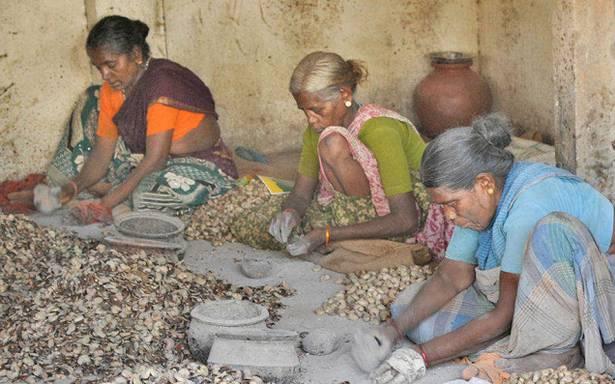Tamil Nadu: Lockdown Leaves About 2.5 Lakh Cashew Nut Workers Feeling the Heat

Image Courtesy: The Hindu
Close to two and a half lakh workers from cashew nut factories spread across twelve districts in Tamil Nadu are feeling the impact of the lockdown. With the industry already suffering a setback owing to the shoddy implementation of the Goods and Sales Tax (GST), the health crisis due to COVID-19 is now taking a toll on the economic condition of the workers. A majority of the workforce – more than 90% – is made up of women. They have been left stranded, without jobs and incomes, as they are daily-wage earners. In Kanyakumari district, about five thousand workers who were employed for collecting honey, are also struggling.
Relief amounting to one thousand rupees for workers registered with the welfare board may bring some relief, but workers enrolled with provident fund (PF) are excluded from it.
NEGLECTED FOR DECADES
Cashew nut factories are quite common in Cuddalore, Kanyakumari, Tirunelveli, Tuticorin, Sivagangai, Pudukottai and a few other districts in the state. These factories provide livelihood to several thousands of rural women. Now, the sector has come to a grinding halt, after the announcement for a total lockdown to tackle the pandemic. Daily-wage workers in the sector feel neglected, and fear for an impending economic crunch amid a looming health crisis.
Mani, a cashew nut worker with four decades of experience, is staying back home without any work. “We feel neglected by the state and union governments. The relief measure from the state government is a welcome one, but all cashew nut workers won’t benefit from this. The workers enrolled in the PF scheme are not eligible for the thousand rupees announced for the workers registered with the welfare boards. Moreover, with no clue of when the lockdown will end, the amount announced is very low”, he said.
WOMEN WORKERS AFFECTED THE MOST
The large workforce of women has taken the hardest hit as a result of the lockdown. Their wages are much less than what had been prescribed by the government. The recommended dearness allowance for workers per day is Rs 110, while they are paid only Rs 69.50 in factories in Kanyakumar. “The wages are for the work finished every single day. The women workers are involved in shelling, peeling and grading work, while men carry out roasting.
More than 90% of the workers are women, and they are the ones most-affected by the present crisis. “They earn between Rs 250 and Rs 300 per day, which has stopped now,” Mani added. Adding to the agony of the underpaid workers, the cashew nut manufacturers association obtained a stay order against the periodic revision of DA for the workers. The association cited increasing input costs after the implementation of the GST as the reason to deny workers the DA hike.
EXTEND RELIEF AND ENSURE MINIMUM WAGES
R. Singaran, the leader of the cashew nut workers union affiliated to the Centre of Indian Trade Unions (CITU) said, “The present lockdown, which is mandatory, will have a huge impact on these workers. They are already being underpaid against the minimum wage norms set by the government. In addition, the denial of DA revision is another blow, against which the labour department has initiated legal proceedings. The governments should ensure the relief measures are reaching all the workers and are revised as per demands.”
Tamil Nadu has significant potential in the sector with close to 91,000 hectares under cultivation, which produces an output of 58,000 metric tonnes annually. Manufacturers make massive profits from exports while workers continue to be neglected. The establishment of a cashew corporation is a long pending demand of workers and the trade unions.
ESTABLISH CASHEW CORPORATION
The neighbouring state of Kerala, another player in the cashew nut industry, incorporated the Kerala State Cashew Development Corporation in 1969. The corporation is involved in manufacturing and marketing of cashew products along with value added products. Workers in Tamil Nadu have continued to raise their demand for such a body. “The government can create a corporation and utilise the sea shores, revenue poramboke (unassessed lands which are the property of Government used or reserved for public) and other unused lands to increase production. This will create further employment for the rural women in the state with job protection and an assured minimum income,” Singaran added.
Another highly-neglected section are honey collectors, also left with no options for their livelihood. Singaran said that close to “5000 workers are involved in honey collection work in Kanyakumari district. They usually keep honey collection boxes in rubber plantations and other fields. The sell their produces in cooperative stores for their living. Now, this is not possible and they are not enrolled or registered with any welfare boards, leaving them out of any relief measures.”
Get the latest reports & analysis with people's perspective on Protests, movements & deep analytical videos, discussions of the current affairs in your Telegram app. Subscribe to NewsClick's Telegram channel & get Real-Time updates on stories, as they get published on our website.
























